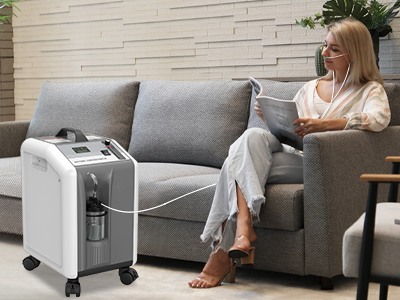04 Mar 2024
Oxygen concentrators are medical devices that extract oxygen from the surrounding air and deliver it in higher concentrations to individuals with respiratory insufficiency or lung disorders.
Oxygen is vital for lung function as it facilitates the exchange of gases in the lungs, ensuring that oxygen is absorbed into the bloodstream and carbon dioxide is expelled during respiration.

Functioning of Oxygen Concentrators
A. Oxygen Generation Process
Oxygen concentrators utilize molecular sieve technology or membrane separation to extract oxygen molecules from ambient air, producing a continuous flow of oxygen for therapeutic use.
B. Delivery of Oxygen to the Lungs
Once generated, the oxygen is delivered through nasal cannulas, masks, or other delivery devices, allowing it to be inhaled and transported to the lungs to support respiratory function.
Benefits of Oxygen Therapy for Lung Health
A. Improved Oxygenation
Oxygen therapy provided by concentrators enhances oxygenation of the blood, ensuring that an adequate supply of oxygen reaches the tissues and organs, including the lungs.
B. Reduction of Hypoxemia
By increasing the oxygen levels in the blood, oxygen therapy helps alleviate hypoxemia, a condition characterized by low levels of oxygen in the blood, which can lead to impaired lung function and other health complications.
Conditions Requiring Oxygen Therapy
A. Chronic Obstructive Pulmonary Disease (COPD)
Individuals with COPD often experience impaired lung function and may require supplemental oxygen therapy to alleviate symptoms such as shortness of breath and improve lung function.
B. Pulmonary Fibrosis
Patients with pulmonary fibrosis, a progressive lung disease characterized by scarring of lung tissue, may benefit from oxygen therapy to relieve respiratory distress and improve lung function.

Role of Oxygen Concentrators in Respiratory Support
A. Supplemental Oxygen Therapy
Oxygen concentrators provide supplemental oxygen therapy to individuals with respiratory conditions, helping to maintain adequate oxygen levels in the bloodstream and support lung function.
B. Management of Respiratory Distress
During acute exacerbations of lung diseases or episodes of respiratory distress, oxygen concentrators play a crucial role in delivering high-flow oxygen therapy to stabilize patients and prevent further complications.
Impact of Oxygen Concentrators on Lung Function
A. Alleviation of Breathing Difficulties
Oxygen concentrators alleviate breathing difficulties by delivering oxygen directly to the lungs, relieving symptoms such as dyspnea (shortness of breath) and promoting easier breathing.
B. Enhancement of Exercise Tolerance
With improved oxygenation, individuals using oxygen concentrators experience enhanced exercise tolerance, allowing them to engage in physical activities and maintain a better quality of life.
Long-Term Use and Lung Health
A. Maintenance of Lung Function
Long-term use of oxygen concentrators helps maintain lung function by ensuring that the lungs receive an adequate supply of oxygen, which is essential for cellular metabolism and tissue repair.
B. Prevention of Complications
By preventing episodes of hypoxemia and respiratory distress, oxygen concentrators help reduce the risk of complications associated with lung diseases, promoting overall lung health and well-being.
Conclusion
A. Significance of Oxygen Concentrators in Lung Health
Oxygen concentrators play a critical role in supporting lung function and respiratory health by delivering supplemental oxygen therapy to individuals with lung disorders, ensuring adequate oxygenation and alleviating breathing difficulties.
B. Ensuring Optimal Lung Function with Oxygen Therapy
For individuals with compromised lung function or respiratory conditions, the use of oxygen concentrators is essential for maintaining optimal lung function, improving quality of life, and reducing the risk of complications associated with inadequate oxygenation.
Keywords: oxygen concentrator
Originally published 04 Mar 2024, updated 04 Mar 2024.